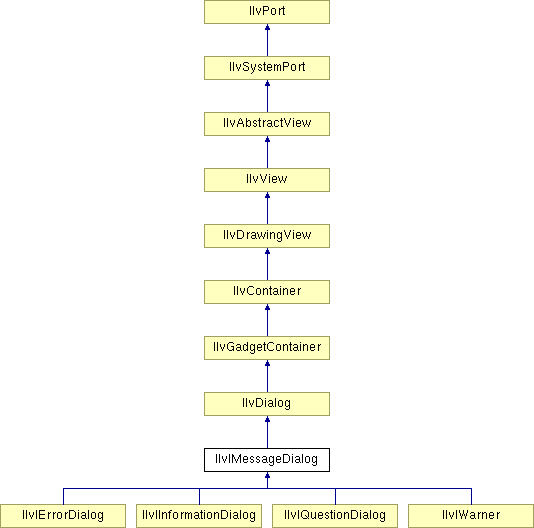
Rogue Wave Views 5.6
Rogue Wave Views
Gadgets Package API Reference Guide
Rogue Wave Views
Documentation Home
 Rogue Wave Views 5.6 |
Rogue Wave Views |
Rogue Wave Views Documentation Home |
Dialog class. More...
#include <ilviews/gadgets/stdialog.h>

Public Member Functions | |
| IlvIMessageDialog (IlvDisplay *display, const char *const *strings, IlUShort count, IlBoolean copy=IlTrue, const char *fileordata=0, IlvIDialogType type=IlvDialogOkCancel, IlvSystemView transientFor=0) | |
| Constructor. | |
| IlvIMessageDialog (IlvDisplay *display, const char *string, const char *fileordata=0, IlvIDialogType type=IlvDialogOkCancel, IlvSystemView transientFor=0) | |
| Constructor. | |
| IlBoolean | get (IlBoolean grab=IlFalse, IlvCursor *cursor=0) |
| Displays the dialog as a modal dialog. | |
| IlBoolean | getResult () |
| Returns a Boolean value indicating whether the user clicked on Apply or Cancel in the dialog. | |
| void | setString (const char *const *strings, IlUShort count, IlBoolean copy=IlTrue) |
| Sets a message with multiple lines to the dialog. | |
| void | setString (const char *string) |
| Sets a message with a single line to the dialog. | |
Dialog class.
Library: ilvgadgt
The IlvIMessageDialog class asks the user a question and expects a yes or no answer. IlvIMessageDialog has predefined subclasses for questions (IlvIQuestionDialog), warnings (IlvIWarner), errors (IlvIErrorDialog), and information (IlvIInformationDialog). The names of the graphic object are displayed to let you modify the default look of the dialog box.

- A Message Dialog -
| IlvIMessageDialog::IlvIMessageDialog | ( | IlvDisplay * | display, | |
| const char * | string, | |||
| const char * | fileordata = 0, |
|||
| IlvIDialogType | type = IlvDialogOkCancel, |
|||
| IlvSystemView | transientFor = 0 | |||
| ) |
Constructor.
Initializes a new instance of the IlvIMessageDialog class that initially displays a message with a single line.
| display | The connection to the display. | |
| string | The message to be displayed. | |
| fileordata | Specifies an alternative source of Rogue Wave Views data defining the user interface of this dialog. This data can be stored in a file, in which case fileordata represents the name of the file, or in a C++ string, in which case fileordata stands for the string itself. If fileordata is not specified, the default dialog is used. | |
| type | The type of the dialog. For details,see IlvIDialogType. | |
| transientFor | A system view for which the dialog is transient. For details,see the IlvView constructors. |
| IlvIMessageDialog::IlvIMessageDialog | ( | IlvDisplay * | display, | |
| const char *const * | strings, | |||
| IlUShort | count, | |||
| IlBoolean | copy = IlTrue, |
|||
| const char * | fileordata = 0, |
|||
| IlvIDialogType | type = IlvDialogOkCancel, |
|||
| IlvSystemView | transientFor = 0 | |||
| ) |
Constructor.
Initializes a new instance of the IlvIMessageDialog class that initially displays a message with multiple lines.
| display | The connection to the display. | |
| strings | An array of strings representing the message to be displayed. | |
| count | The number of elements in the strings array. | |
| copy | Not used. | |
| fileordata | Specifies an alternative source of Rogue Wave Views data defining the user interface of this dialog. This data can be stored in a file, in which case fileordata represents the name of the file, or in a C++ string, in which case fileordata stands for the string itself. If fileordata is not specified, the default dialog is used. | |
| type | The type of the dialog. For details, see IlvIDialogType. | |
| transientFor | The system view for which the dialog is transient. For details, see the IlvView constructors. |
Displays the dialog as a modal dialog.
| grab | A Boolean value specifying whether the dialog should be system modal. A system modal dialog grabs input events occurring on the entire system so that other applications are not able to catch any keyboard or mouse event until the member function returns. In this case, you can specify the cursor to be used with the cursor parameter. If grab is set to IlFalse (the default), the dialog is application modal, which means that the application does not receive input events in other windows. |
| cursor | The cursor used to make the selection. |
IlvIMessageDialog::getResult. | IlBoolean IlvIMessageDialog::getResult | ( | ) |
Returns a Boolean value indicating whether the user clicked on Apply or Cancel in the dialog.
IlTrue if the dialog was closed by calling the IlvDialog::apply method, or IlFalse if the dialog was closed by calling the IlvDialog::cancel method. | void IlvIMessageDialog::setString | ( | const char *const * | strings, | |
| IlUShort | count, | |||
| IlBoolean | copy = IlTrue | |||
| ) |
Sets a message with multiple lines to the dialog.
The dialog is resized to fit the size of the new message.
| strings | An array of strings representing the message to be displayed. | |
| count | The number of elements in the strings array. param copy Not used. |
| void IlvIMessageDialog::setString | ( | const char * | string | ) |
Sets a message with a single line to the dialog.
The dialog is resized to fit the size of the new message.
| string | The new message displayed by the dialog. |
© Copyright 2012, Rogue Wave Software, Inc. All Rights Reserved.
Rogue Wave is a registered trademark of Rogue Wave Software, Inc. in the United States and other countries. All other trademarks are the property of their respective owners.